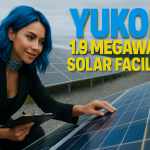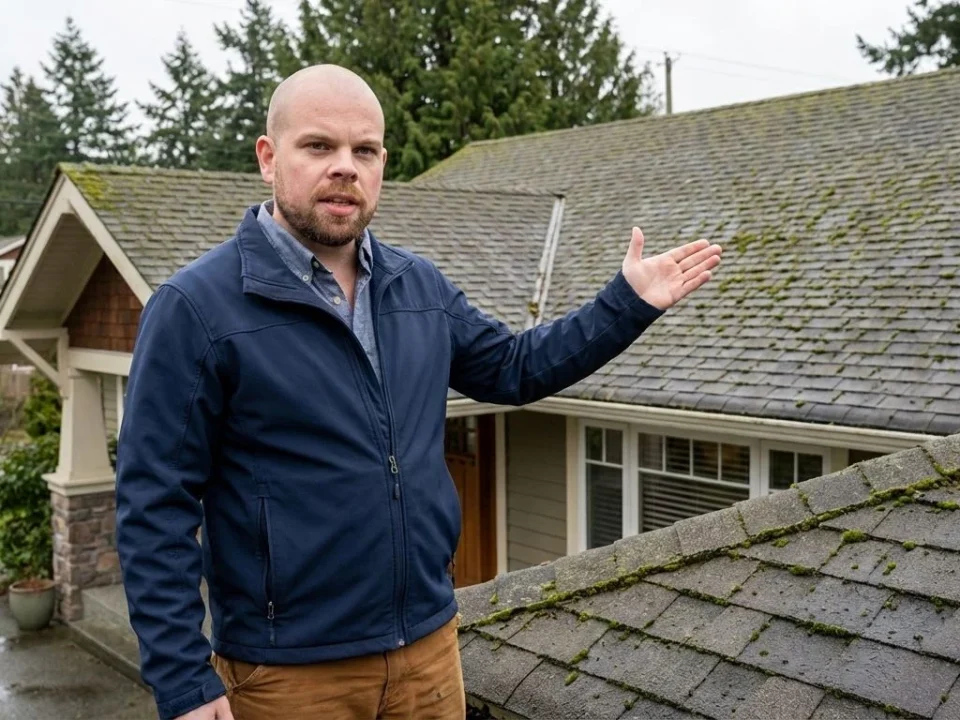
Solar Panels Ontario Installation Cost Guide 2025
August 11, 2025
Yukon Solar Panels: the 1.9-Megawatt Beaver Creek Project
August 14, 2025How Much Do Solar Panels Cost in BC?
Let’s get right to it. The biggest question is always about the price. In British Columbia, the cost to install solar panels isn’t a simple one-size-fits-all number. It moves around based on where you are, who you hire, and what you put on your roof.

What is the Average Cost of Solar Panels?
Based on recent data from across the province, you can expect the cost of a solar panel installation to be between $2.60 and $3.27 per watt.
So, what does that mean for your wallet? For a typical 5-kilowatt (kW) residential solar system, you’re looking at a total cost of roughly $13,000 to $16,350 before any rebates or incentives. If you’re in the Greater Vancouver area, prices tend to be a bit higher, averaging around $3.19 per watt, mostly because of higher labour and permitting costs.
I’ve seen real-world invoices where a 7 kW system ends up costing closer to $20,000 after necessary extras are factored in. Things like upgrading an old electrical panel or dealing with complex wiring can add 10-20% to the initial quote. It’s a common frustration and something to be aware of from the start.

Factors Influencing Solar Panel Costs
Several things determine the final price of your solar panel system:
- System Size: The more power you need, the more solar panels you’ll have to install, and the higher the cost. A larger home or one with an electric vehicle will need a bigger system.
- Panel Quality: High-efficiency solar panels from premium brands cost more upfront but generate more power over their lifespan, which can lead to better long-term savings.
- Inverter Type: You’ll choose between string inverters, which are cheaper, and micro-inverters, which are more expensive but perform better, especially if your roof has some shading.
- Roof Condition: If your roof is old or needs repairs, you’ll have to fix that before installing solar panels, adding to the overall project cost. The complexity of your roof (steepness, number of angles) also plays a part.
- Installer: Prices vary between installers. Large national companies might have higher overhead, while smaller local outfits could have longer wait times. It’s crucial to get multiple quotes.

Is Solar Power Worth It in British Columbia?
This is the million-dollar question, isn’t it? With BC Hydro’s electricity rates being some of the lowest in North America, the financial argument for solar can seem thin at first glance.
BC Hydro’s Tier 1 rate is just 11.72 cents per kilowatt-hour (kWh). When you compare that to places like Ontario, where rates can be double that, the immediate savings from avoiding your utility bill are smaller. This stretches out the payback period for a solar investment, often to 12 years or more, especially with rising interest rates on loans.
However, the picture is changing. FortisBC, another major utility in the province, is set for a 5.65% rate increase in 2025. This signals a trend of rising energy costs that makes generating your own power more attractive.
But looking only at the simple payback misses the point. The real value is in controlling your own power. When you have a solar PV system, you’re protected from the next rate hike. You decide where your energy comes from.

What are the BC Solar Incentives and Rebates?
Incentives can significantly shorten your payback period and make the upfront cost of installing solar panels much more manageable. Here’s what’s available in British Columbia.

Overview of Solar Rebates in BC
The main incentive for homeowners in BC is the BC Hydro Solar Rebate Program. This program offers a rebate for installing a solar photovoltaic (PV) system. It’s pretty straightforward: you get $1,000 for every kilowatt (kW) of solar you install, but it’s capped at $5,000.
| System Size | Rebate Amount |
| 3 kW | $3,000 |
| 4 kW | $4,000 |
| 5 kW or more | $5,000 (Max) |
This means a 5 kW system or larger would be eligible for the full $5,000 rebate. If you also install a battery storage system, you could get an additional rebate, but the solar portion is capped.
Tip for Rebates: The BC Hydro rebate program requires pre-registration. You must get your eligibility confirmed before you install anything. Missing this step means you won’t get the rebate. It’s a simple but critical piece of paperwork.

Canada Greener Homes Program
The federal Canada Greener Homes Grant officially closed to new applicants on March 31, 2024. This program was a major driver for solar adoption, offering up to $5,000. Its closure was a blow to many homeowners who were counting on that extra cushion. While the grant is gone, the interest-free Canada Greener Homes Loan is still available, offering up to $40,000 to help finance your energy efficiency upgrades, including solar.
How Tax Credit works in BC
British Columbia gives you a break on the Provincial Sales Tax (PST) for solar equipment. This saves you 7% on the hardware cost. For a typical system, the panels and inverters might cost $10,000. The PST exemption puts $700 directly back in your pocket.

How Net Metering works in BC
BC Hydro’s Net Metering Program is how you get credit for the excess energy your solar panels produce. When your system generates more power than your home is using, the surplus electricity is sent to the grid. BC Hydro tracks this and gives you a credit on your bill.
At the end of your 12-month billing cycle, if you’ve produced more energy than you’ve consumed, BC Hydro will pay you for that surplus. The rate is based on the market price, which is currently around 9.99 cents per kWh. This is lower than the retail rate you pay for electricity, so it doesn’t make financial sense to install a massive system just to sell power back.
Tip for System Sizing: The goal with the BC Hydro net metering program is to size your solar system to match your annual electricity consumption, not to make a profit. Right-sizing your array ensures you get the most value from your solar investment.

How to Apply for Solar Incentives in BC
- Energy Audit: For many programs, including the Greener Homes Loan, you need a pre-retrofit EnerGuide evaluation.
- Pre-Registration: For the BC Hydro rebate, you must pre-register and get approval before installation.
- Installation: Hire a qualified installer to set up your solar panel system.
- Post-Installation: Complete a post-retrofit EnerGuide evaluation and submit all your documents to the respective programs.
How Does Solar Panel Installation Work in British Columbia?
The process of installing solar panels on your home is fairly straightforward, but it involves several key steps and coordination with different parties.
Steps for Installing Solar Panels in BC
- Consultation and Quote: The first step is to contact a few reputable solar installers. They’ll assess your home’s suitability for solar, discuss your energy needs, and provide a detailed quote.
- Design and Permitting: Once you choose an installer, they will design a solar PV system tailored to your roof and energy goals. They will also handle the municipal permits, which can sometimes be a lengthy process depending on your location.
- Installation: The physical installation of the solar panels, racking, and inverters usually takes just a few days.
- BC Hydro Interconnection: Your installer will submit an interconnection request to BC Hydro. This process can take several weeks, as BC Hydro needs to review the system to ensure it’s safe to connect to the grid.
- Inspection and Commissioning: A certified electrician will inspect the installation. Once it passes, the system is commissioned, and you can start generating your own clean energy.
Choosing the Right Solar Panel System
The right solar system for you depends on your budget, energy needs, and roof characteristics. High-efficiency solar panels are great for homes with limited roof space. If you have trees that cast shadows, micro-inverters are a better choice than a string inverter because they optimize the output of each individual panel.

Understanding Grid-Tied Solar Systems
Nearly all residential solar systems in British Columbia are grid-tied. This means your home is still connected to the BC Hydro grid. When your solar panels are producing power, your home uses that first. If you need more power than your panels are generating (like at night), you seamlessly draw it from the grid. When you produce excess power, it flows back to the grid.
What is the Role of BC Hydro in Solar Energy?
BC Hydro is central to the experience of going solar in the province. They manage the grid, run the net metering program, and provide the main rebate.
Explaining BC Hydro’s Net Metering Program
As mentioned, the net metering program allows you to “bank” excess solar energy as credits. These credits offset the cost of electricity you use from the grid when your panels aren’t producing. It’s a system designed to help you break even on your energy use over the year.
How Solar Energy Affects Your BC Hydro Bill
Once your solar panel system is running, you’ll see a significant change in your BC Hydro bill. For many months of the year, your bill could be close to zero, or you might even have a credit balance. You’ll still pay a small basic charge to stay connected to the grid, but your electricity usage charges will drop dramatically.
Managing Excess Energy Production
At the end of your annual billing cycle, BC Hydro will pay you for any net surplus of energy you’ve produced. The payout rate is lower than the retail rate, so it’s best to use the energy yourself. One way to do this is by adding an electric vehicle or a heat pump, which increases your home’s electricity consumption and allows you to use more of your own solar power.

Why Should You Switch to Solar in British Columbia?
Even with the unique economic factors in BC, there are powerful reasons to make the switch to solar energy.
Benefits of Solar Energy in BC
- Lower Energy Bills: Solar power will reduce your monthly electricity costs.
- Protection from Rising Rates: You lock in your energy costs for the 25+ year lifespan of your solar panels.
- Increased Home Value: Homes with solar panels can have higher property values.
- Environmental Impact: You’ll be reducing your carbon footprint by using a clean, renewable energy source.
Achieving Energy Independence with Solar
One of the most compelling reasons to go solar is to gain a degree of energy independence. While a grid-tied system doesn’t take you completely off-grid, it gives you control over your power generation. You are less reliant on a large utility and the fluctuating costs of electricity.
I remember helping a family in the Kootenays who were tired of the frequent power outages in their area. We installed a solar system with a small battery backup. The next time a storm knocked out the power, their lights stayed on. That feeling of security and self-sufficiency is something you can’t put a price on.
Contributing to Clean Energy and Sustainability
By installing solar panels, you become part of the solution to climate change. British Columbia is already a leader in clean energy, with most of its power coming from hydro. Adding distributed solar energy from homes and businesses across the province makes the grid more resilient and reduces the need for large-scale, centralized power generation. Your solar investment is a direct contribution to a more sustainable future for BC.
Canada goes Solar. Vitaliy Lano, SolarEnergies.ca




